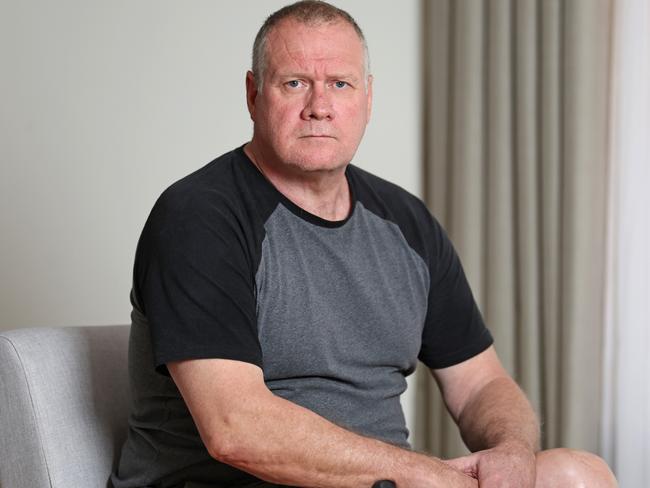How Australians are being conned of almost $3bn a year through scams
Doug Wright survived a head-on crash only to fall victim to an investment scam, as crims use sophisticated tricks to con Aussies out of almost $3b a year. See how they do it. Watch the video.

True Crime
Don't miss out on the headlines from True Crime. Followed categories will be added to My News.
Exclusive: Doug Wright survived a brutal head-on crash, only to fall victim to a nearly $1 million investment scam.
The former fly-in-fly-out miner, whose leg was amputated in the 2012 crash, was setting up a new business using his compensation payout six-years ago when he came across a “golden investment opportunity”.
“I saw an ad on Facebook for people who were looking to invest and get a higher rate of return on their investment,” Mr Wright said. “I filled out the online form … and was then contacted by a man who said he was from Switzerland.”

Mr Wright, 59, invested $750,000 over six months before the money “stopped flowing” and he realised he had been scammed.
He enlisted a private investigator who worked out the con was operating in Israel, not Switzerland.
“I was never able to recover any of the money and the situation has left me in a place where I have had to start all over again financially,” he said, noting he also spent more than $250,000 on legal fees.
Mr Wright’s tale of loss comes as the federal government said it would bring in legislation by the end of the year to make social media companies accountable for the role they play in perpetuating scams.
It also follows this masthead’s Let them Be Kids campaign, shining the light on social media abuse and calling for the age limit that children can access social media to be raised to 16 years.
Anti-scam chief Catriona Lowe said serious criminals were using sophisticated tricks to con Australians out of almost $3 billion a year, with a fifth of those losses attributed to social media.
She said scams were seriously underreported due to victims being embarrassed, meaning losses were probably far higher.

“We want people to share a story, stop a scam,” said Ms Lowe, deputy chair of the Australian Competition and Consumer Commission, ahead of a new awareness campaign next week.
“The research, and indeed the conversations we have with people, is that there is a sense of shame and embarrassment.”
Ms Lowe said scams on social media accounted for six per cent of reports to Scamwatch – run by the National-Anti Scam Centre – but made up 20 per cent of the total losses reported.
Text messages accounted for 40 per cent of reports, but only six per cent of losses, while phone calls made up 15 per cent of reports, and 35 per cent of losses.
“We can really see that social media and phone calls are very much the more effective mechanisms that scammers are using,” Ms Lowe said.
On social media, scammers were conning people via investment ads using fake celebrity endorsements and romance scams. The number of job scams jumped by 150 per cent in 2023, compared with 2022.
Facebook Marketplace is rife with scammers, according to experts.
In the first six months of the year, 74 under-18s were scammed, with the 35 to 44-year-old age group reporting the most scams and losing $4m. There were fewer reports from the 45 to 54-year age group, but they lost more, $6.2m, while the biggest losses were in the over 65s group with yet again fewer reports, but $6.6m of losses.

“There is a scam for everybody,” Ms Lowe said. “ … whether it’s that investment opportunity, whether it is finding that extra work to make ends meet, whether it is looking for romance, these are all very natural human endeavours.
“What the scammers are doing is exploiting those endeavours.”
Assistant Treasurer and Minister for Financial Services Stephen Jones said new codes of practice for social media companies would be made law as a matter of priority, following consultation.
The codes would require platforms to verify their advertisers and set up a complaints department to respond to users in real time.
Minister Jones said something needed to be done because scams had become “industrialised and Australians have been sitting ducks because the defences weren’t there”.

“Currently I could put an ad on the social media platform pretending to be somebody that I wasn’t and offering an investment product that didn’t exist,” he said.
“They’re out there in the thousands and people are falling for them every hour of every day.”
In anticipation of the new codes, platforms have published a voluntary code of practice, which Minister Jones described as a “document full of weasel words that impose no obligations, really doesn’t provide any uplift for consumers, for consumer safety”.
Report a scam at scamwatch.gov.au/report-a-scam.
EX-COP HUNTS DOWN FACELESS ROMANCES SCAMMERS
Kylee Dennis was a cop for 14 years but now has a different type of criminal in her sights – online romance scammers.
In a one-woman- almost-vigilante capacity, she has been hunting down the faceless crooks – and reporting them to social sites – since 2023.
The victims she helps, through her online agency Two Face Investigations, age in range from 50 to 86 years old.
“I also go undercover as a 67-year-old old male and 62-year-old female to look at language and tactics scammers use towards their victims,” Ms Dennis, from Shellharbour, NSW, said.
“They tap into their victim’s deepest secrets and start creating this friendship to isolate them.
“Many of these victims have not reported their losses and have lost anything from $30 to $500,000.”
In the first half of this year, the National Anti-Scam Centre reported 1700 romance scam cases and $11.1 million in losses, mostly through social media and email.
Most commonly, scammers create fake Facebook profiles, request friend status, only to gain access to the account holder’s personal information. Other times they use stolen pictures of people to message victims on Instagram.

“We are talking about victims that are intelligent people. We’re not talking about uneducated individuals,” Ms Dennis said.
“So the scammers though they are uneducated, they use tactics from essentially the same playbook. It’s manipulative.”
Ms Dennis worries about the victims “dealing with this in secret.”
“I will report a fake Facebook or Instagram profile and it still remains on the platform.
“I can’t get my head around how accounts remain on Facebook that teach people how to scam, or how (Meta boss) Mark Zuckerberg can sit in his ivory tower and accept this.
“They’ve created these amazing platforms on Facebook and Instagram, but there’s a dark side in there and it’s horrific.
“This is awful. Everything about this is just unacceptable.”
Financial Services Minister Stephen Jones, whose government is working on a new code to hold social media companies to greater account, said romance scams were “particularly vicious”.
“They exploit the basic human emotion of wanting to connect and find love,” Mr Jones said.
“As more and more people go online to connect, scammers adapted their tactics, filtering into social media and dating apps.
“Social media companies can and should do much more to get these criminals off their platforms.”
More Coverage
Originally published as How Australians are being conned of almost $3bn a year through scams




